Rocky’s Boots
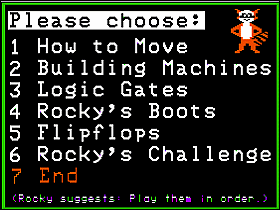 The Learning Company tries on Rocky’s Boots, an innovative educational computer game designed to teach players the basics of circuit diagrams and basic logic by designing virtual machines to kick specific objects on screen. The game is designed by Warren Robinett, a former Atari programmer whose previous claim to fame is the hit game Adventure.
The Learning Company tries on Rocky’s Boots, an innovative educational computer game designed to teach players the basics of circuit diagrams and basic logic by designing virtual machines to kick specific objects on screen. The game is designed by Warren Robinett, a former Atari programmer whose previous claim to fame is the hit game Adventure.
Q*Bert
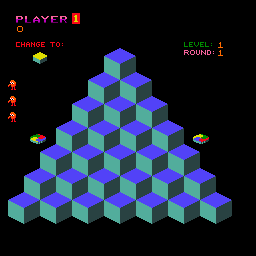 Pinball maker D. Gottlieb & Co., via its Mylstar video game division, graces arcades with the qute qreatures of Q*Bert. Though it rakes in quarters abundantly, Q*Bert’s easily recognizable characters briefly prove to be a licensing gold mine, resulting in toys, clothing, children’s books, and even a Saturday morning cartoon. The game is fast-tracked to numerous home video game systems.
Pinball maker D. Gottlieb & Co., via its Mylstar video game division, graces arcades with the qute qreatures of Q*Bert. Though it rakes in quarters abundantly, Q*Bert’s easily recognizable characters briefly prove to be a licensing gold mine, resulting in toys, clothing, children’s books, and even a Saturday morning cartoon. The game is fast-tracked to numerous home video game systems.
Super Zaxxon
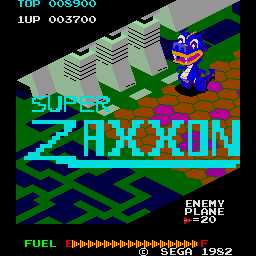 Desperately trying to keep its coin-op games fresh, Sega releases the arcade game conversion kit Super Zaxxon. The kit updates Zaxxon machines with new graphics and levels, giving arcade operators the chance to put a “new” machine in circulation without purchasing an entire new cabinet.
Desperately trying to keep its coin-op games fresh, Sega releases the arcade game conversion kit Super Zaxxon. The kit updates Zaxxon machines with new graphics and levels, giving arcade operators the chance to put a “new” machine in circulation without purchasing an entire new cabinet.
The Voice of Odyssey2
 The Odyssey2 video game console gets its first major hardware upgrade in the form of the add-on voice synthesizer module, marketed as the Voice of Odyssey2. With the Type & Tell cartridge packed in, the Voice promises to add speech to numerous specially marked Odyssey2 games. The initial line of Voice games, also released on or around this date, includes K.C.’s Krazy Chase (a sequel to the sued-off-the-market K.C. Munchkin), and educational games Nimble Numbers NED and SID The Spellbinder.
The Odyssey2 video game console gets its first major hardware upgrade in the form of the add-on voice synthesizer module, marketed as the Voice of Odyssey2. With the Type & Tell cartridge packed in, the Voice promises to add speech to numerous specially marked Odyssey2 games. The initial line of Voice games, also released on or around this date, includes K.C.’s Krazy Chase (a sequel to the sued-off-the-market K.C. Munchkin), and educational games Nimble Numbers NED and SID The Spellbinder.
Megamania!
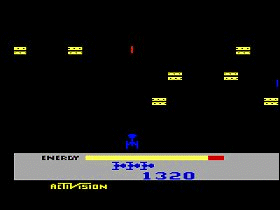 Activision releases the Megamania! cartridge for the Atari VCS home video game system. Inspired by the arcade game Astro Blaster, and subtitled “A Space Nightmare”, Megamania! pits players against airborne bow ties and hamburgers – and their own energy management skills. A national TV ad campaign featuring The Tubes heralds the game’s arrival.
Activision releases the Megamania! cartridge for the Atari VCS home video game system. Inspired by the arcade game Astro Blaster, and subtitled “A Space Nightmare”, Megamania! pits players against airborne bow ties and hamburgers – and their own energy management skills. A national TV ad campaign featuring The Tubes heralds the game’s arrival.
Mr. Do!
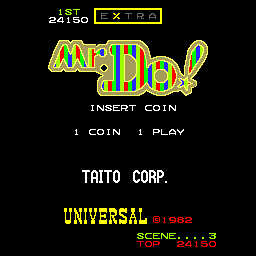 Universal (a video game manufacturer unrelated to the Hollywood studio of the same name) introduces a cute arcade action game, Mr. Do!, casting players as a clown with a deadly weapon to use against underground monsters. Mr. Do! leads a revolution in the video game industry not with its game play, but with its form factor: it is sold as a conversion kit which can be plugged into a generic arcade cabinet, a concept which could potentially save arcade operators thousands of dollars by sparing them the expense of having to purchase an entire new machine to swap out games.
Universal (a video game manufacturer unrelated to the Hollywood studio of the same name) introduces a cute arcade action game, Mr. Do!, casting players as a clown with a deadly weapon to use against underground monsters. Mr. Do! leads a revolution in the video game industry not with its game play, but with its form factor: it is sold as a conversion kit which can be plugged into a generic arcade cabinet, a concept which could potentially save arcade operators thousands of dollars by sparing them the expense of having to purchase an entire new machine to swap out games.
The Atari 5200
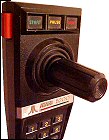 After a long development process (during which it was briefly known as “Atari Video System X”), Atari introduces its own next-generation video game console, Atari 5200. Dubbed “The Supersystem,” the new console, boasting far better graphics and sound capabilities than the VCS, is hampered by one of the worst controller concepts in video game history. Also not helping the 5200’s chances are the lack of an adapter allowing VCS owners to painlessly transition to the new system, a peripheral already available for the Colecovision. (In keeping with the new system’s name, the VCS is also now marketed as the Atari 2600.)
After a long development process (during which it was briefly known as “Atari Video System X”), Atari introduces its own next-generation video game console, Atari 5200. Dubbed “The Supersystem,” the new console, boasting far better graphics and sound capabilities than the VCS, is hampered by one of the worst controller concepts in video game history. Also not helping the 5200’s chances are the lack of an adapter allowing VCS owners to painlessly transition to the new system, a peripheral already available for the Colecovision. (In keeping with the new system’s name, the VCS is also now marketed as the Atari 2600.)
Change Lanes
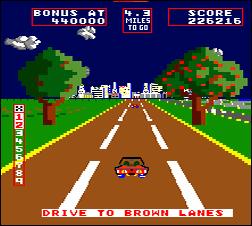 Taito America releases the arcade game Change Lanes, designed by Dave Needle, in American arcades. The game is an early mash-up of first-person racing and combat genres, putting players in the driver’s seat of a multi-terrain car that must ram through enemies and avoid missiles launched by aircraft to survive long enough to refuel.
Taito America releases the arcade game Change Lanes, designed by Dave Needle, in American arcades. The game is an early mash-up of first-person racing and combat genres, putting players in the driver’s seat of a multi-terrain car that must ram through enemies and avoid missiles launched by aircraft to survive long enough to refuel.
Joust
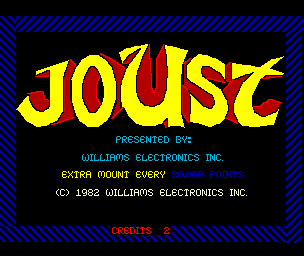 With the words “Prepare to joust, buzzard bait!”, Williams Electronics launches an arcade sleeper hit built on unlikely juxtapositions (medieval knights, jousting with lances, riding on ostriches, over a lake of lava, stalked by pterodactyls). Joust becomes immensely popular for its simultaneous two-player mode, in which one’s buddy can be as much of a liability as any of the computer-controlled enemies. Whispers of movie deals based on the game are briefly heard before the video game industry’s fortunes change at the end of the year.
With the words “Prepare to joust, buzzard bait!”, Williams Electronics launches an arcade sleeper hit built on unlikely juxtapositions (medieval knights, jousting with lances, riding on ostriches, over a lake of lava, stalked by pterodactyls). Joust becomes immensely popular for its simultaneous two-player mode, in which one’s buddy can be as much of a liability as any of the computer-controlled enemies. Whispers of movie deals based on the game are briefly heard before the video game industry’s fortunes change at the end of the year.
Burgertime
 Data East’s food-obsessed arcade game Burgertime debuts in the United States, licensed locally by Midway. Challenging players – who may or may not be old salts at the fast-food business – to work their buns off trying to complete several burgers despite a revolt by the ingredients, Burgertime becomes a hit with seasoned gamers.
Data East’s food-obsessed arcade game Burgertime debuts in the United States, licensed locally by Midway. Challenging players – who may or may not be old salts at the fast-food business – to work their buns off trying to complete several burgers despite a revolt by the ingredients, Burgertime becomes a hit with seasoned gamers.
Donkey Kong goes small
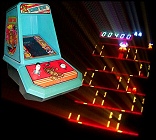 Coleco releases the LED matrix-driven tabletop version of Donkey Kong in a colorful case with arcade artwork. The game play and graphics are somewhat lacking, but the mini-arcade games tend to sell well since they don’t require connection to the family TV.
Coleco releases the LED matrix-driven tabletop version of Donkey Kong in a colorful case with arcade artwork. The game play and graphics are somewhat lacking, but the mini-arcade games tend to sell well since they don’t require connection to the family TV.
Ultima II
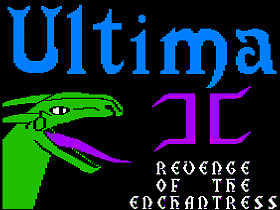 Sierra releases the computer role playing game game Ultima II: Revenge Of The Enchantress for the Apple II. Written by Richard “Lord British” Garriott, this is the second volume of the best-selling Ultima series of RPGs, and the first to introduce space travel and science fiction elements into the games’ sword-and-sorcery fantasy setting.
Sierra releases the computer role playing game game Ultima II: Revenge Of The Enchantress for the Apple II. Written by Richard “Lord British” Garriott, this is the second volume of the best-selling Ultima series of RPGs, and the first to introduce space travel and science fiction elements into the games’ sword-and-sorcery fantasy setting.
Pitfall!
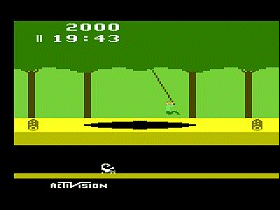 Activision releases the Pitfall! cartridge for the Atari VCS home video game system. Subtitled “The Adventure of Pitfall Harry” (implying that further adventures are yet to come), this becomes one of the Atari VCS’ “killer app” games, and is ported to other systems and updated for more modern platforms for decades to come.
Activision releases the Pitfall! cartridge for the Atari VCS home video game system. Subtitled “The Adventure of Pitfall Harry” (implying that further adventures are yet to come), this becomes one of the Atari VCS’ “killer app” games, and is ported to other systems and updated for more modern platforms for decades to come.
Colecovision released
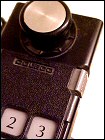 The video game wars officially enter a new generation of hardware as Connecticut-based toymaker Coleco unveils the Colecovision home video game system. Packaged with an almost-but-not-quite-arcade-accurate port of the hit game Donkey Kong, and pushed by an advertising campaign focusing on the message of “bringing the arcade experience home,” Colecovision’s best opening gambit may be an “Expansion Module” allowing the use of Atari VCS games on the console, making it possible for Atari owners to step up without having to rebuild their game libraries from scratch.
The video game wars officially enter a new generation of hardware as Connecticut-based toymaker Coleco unveils the Colecovision home video game system. Packaged with an almost-but-not-quite-arcade-accurate port of the hit game Donkey Kong, and pushed by an advertising campaign focusing on the message of “bringing the arcade experience home,” Colecovision’s best opening gambit may be an “Expansion Module” allowing the use of Atari VCS games on the console, making it possible for Atari owners to step up without having to rebuild their game libraries from scratch.
Math Gran Prix
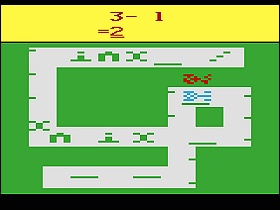 Atari releases its “edutainment” cartridge Math Gran Prix for the Atari VCS, a title designed to stave off critics of video games’ negative effects on kids’ schoolwork. Perhaps predictably, Math Gran Prix fails to cross the retail finish line – the same parents complaining that the Atari is keeping homework from getting done aren’t buying educational games for it.
Atari releases its “edutainment” cartridge Math Gran Prix for the Atari VCS, a title designed to stave off critics of video games’ negative effects on kids’ schoolwork. Perhaps predictably, Math Gran Prix fails to cross the retail finish line – the same parents complaining that the Atari is keeping homework from getting done aren’t buying educational games for it.
Jungle King
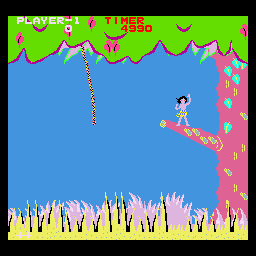 Japanese arcade game manufacturer Taito introduces its latest game, Jungle King, though the game will be known by that name for all of three months. A sampled “Tarzan yell” draws the legal wrath of the Edgar Rice Burroughs estate, and Taito rushes to replace the loincloth-clad player character with a more covered-up, pith-helmeted explorer, retitling the game Jungle Hunt in the process.
Japanese arcade game manufacturer Taito introduces its latest game, Jungle King, though the game will be known by that name for all of three months. A sampled “Tarzan yell” draws the legal wrath of the Edgar Rice Burroughs estate, and Taito rushes to replace the loincloth-clad player character with a more covered-up, pith-helmeted explorer, retitling the game Jungle Hunt in the process.
More about Jungle King / Jungle Hunt in Phosphor Dot Fossils
Son of Donkey Kong
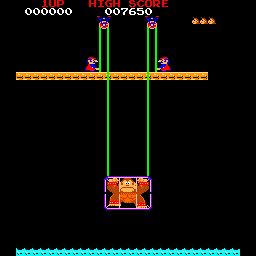 Nintendo follows up on the hugely successful Donkey Kong arcade game with its first sequel, Donkey Kong Junior. Not only does the new game prove that the original’s success wasn’t a fluke, but it gives Mario his name for the first time (well, his first name) and throws in some role reversal, putting the player in the position of having to save Donkey Kong, who was the first game’s nemesis.
Nintendo follows up on the hugely successful Donkey Kong arcade game with its first sequel, Donkey Kong Junior. Not only does the new game prove that the original’s success wasn’t a fluke, but it gives Mario his name for the first time (well, his first name) and throws in some role reversal, putting the player in the position of having to save Donkey Kong, who was the first game’s nemesis.
Moon Patrol
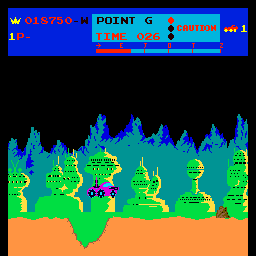 Williams Electronics unleashes an arcade favorite in the making, Moon Patrol. A rare case of a foreign game (originated in Japan by IREM) licensed for American distribution by Williams, Moon Patrol forces prospective moon buggy drivers to make split-second decisions about whether to shoot oncoming obstacles or vault over them in the moon’s low gravity. The game’s colorful graphics and inordinately jaunty music make it an instant hit.
Williams Electronics unleashes an arcade favorite in the making, Moon Patrol. A rare case of a foreign game (originated in Japan by IREM) licensed for American distribution by Williams, Moon Patrol forces prospective moon buggy drivers to make split-second decisions about whether to shoot oncoming obstacles or vault over them in the moon’s low gravity. The game’s colorful graphics and inordinately jaunty music make it an instant hit.
Imagic releases second wave of games
 Imagic, recently formed from another wave of ex-Atari employees, releases its second wave of game cartridges for the Atari VCS, including Atlantis, Cosmic Ark, Fire Fighter and the adventure game Riddle Of The Sphinx.
Imagic, recently formed from another wave of ex-Atari employees, releases its second wave of game cartridges for the Atari VCS, including Atlantis, Cosmic Ark, Fire Fighter and the adventure game Riddle Of The Sphinx.
Pepper II
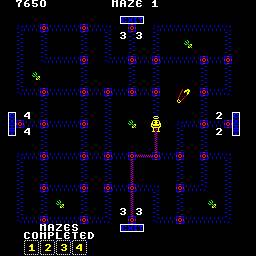 Exidy’s utterly bizarre coin-op video game Pepper II arrives in arcades, and players are given the task of guiding an angelic being on his mission to zip up a maze made of zippers while pursued by little devils. While trying to figure out if any of it makes sense, the industry spends far too much time coining phrases like “wouldn’t you like to be a Pepper II?”
Exidy’s utterly bizarre coin-op video game Pepper II arrives in arcades, and players are given the task of guiding an angelic being on his mission to zip up a maze made of zippers while pursued by little devils. While trying to figure out if any of it makes sense, the industry spends far too much time coining phrases like “wouldn’t you like to be a Pepper II?”
Chopper Command
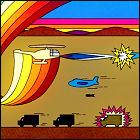 Activision releases the Chopper Command cartridge for the Atari VCS home video game system. Inspired by the arcade game Defender, complete with a “radar view” of areas of the playfield extending beyond the edges of the screen, Chopper Command proves to be graphically superior to Atari’s own home version of that game.
Activision releases the Chopper Command cartridge for the Atari VCS home video game system. Inspired by the arcade game Defender, complete with a “radar view” of areas of the playfield extending beyond the edges of the screen, Chopper Command proves to be graphically superior to Atari’s own home version of that game.
Eyes
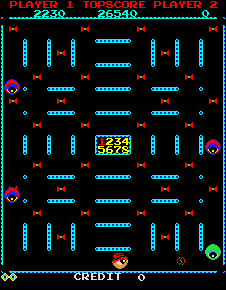 Better known for making jukeboxes and speakers, Rock-Ola makes one of its final attempts to break into the video game industry by releasing Eyes, a maze chase game created by Florida-based Digitrex Techstar. Since many arcades are already flooded with maze games, Eyes seems to disappear from most arcades in a blink; this is one of Rock-Ola’s final attempts to get into the game business.
Better known for making jukeboxes and speakers, Rock-Ola makes one of its final attempts to break into the video game industry by releasing Eyes, a maze chase game created by Florida-based Digitrex Techstar. Since many arcades are already flooded with maze games, Eyes seems to disappear from most arcades in a blink; this is one of Rock-Ola’s final attempts to get into the game business.
Pac-Man Fever on the charts
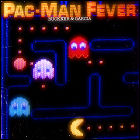 Buckner & Garcia’s hit single Pac-Man Fever reaches its peak on the Billboard Hot 100, reaching #9 on the chart. Over a million copies of the single (backed with an instrumental version of the same song) have sold.
Buckner & Garcia’s hit single Pac-Man Fever reaches its peak on the Billboard Hot 100, reaching #9 on the chart. Over a million copies of the single (backed with an instrumental version of the same song) have sold.
Pac-Man comes home
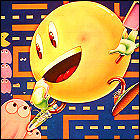 After an extremely short development period and industry insider warnings that the finished product wasn’t ready for prime time, Atari’s home version of Pac-Man for the Atari VCS arrives in stores, selling record numbers… and, within weeks, becomes the subject of bad word-of-mouth and critical slams on its weak game play and graphics. At the urging of Atari CEO Ray Kassar, Pac-Man‘s print run exceeds the number of VCS consoles sold to date, since it’s anticipated that the Pac-crazed public will buy the console simply because Pac-Man is available for it.
After an extremely short development period and industry insider warnings that the finished product wasn’t ready for prime time, Atari’s home version of Pac-Man for the Atari VCS arrives in stores, selling record numbers… and, within weeks, becomes the subject of bad word-of-mouth and critical slams on its weak game play and graphics. At the urging of Atari CEO Ray Kassar, Pac-Man‘s print run exceeds the number of VCS consoles sold to date, since it’s anticipated that the Pac-crazed public will buy the console simply because Pac-Man is available for it.
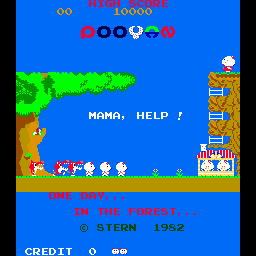 Konami introduces the arcade game
Konami introduces the arcade game  Sega releases the arcade game
Sega releases the arcade game  Sega releases the arcade game
Sega releases the arcade game 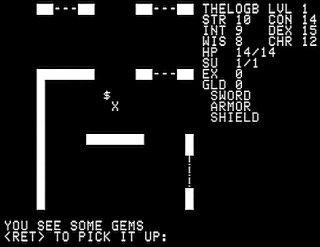 Wargame publisher Avalon Hill’s subsidiary Microcomputer Games Inc. releases the computer role playing game
Wargame publisher Avalon Hill’s subsidiary Microcomputer Games Inc. releases the computer role playing game 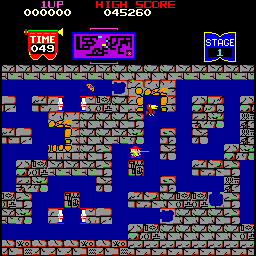 Konami introduces the arcade game
Konami introduces the arcade game  Atari releases the home version of the popular arcade game
Atari releases the home version of the popular arcade game